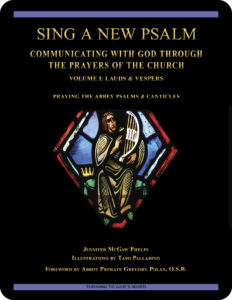 Sing a New Psalm:
Sing a New Psalm:
Communicating with God Through
the Prayers of the Church
Volume I: Lauds & Vespers
Lesson 11 God Will Ransom My Soul
Psalm 49 and Psalm 72
Thursday Vespers (Week I)
Revised Standard Version Catholic Edition (RSVCE)*
New American Bible Revised Edition (NABRE)*
Catechism of the Catholic Church
ex libris (in our library)
next lesson: Have Mercy on Me, O God
This material coordinates with Lesson 11 on pages 46–49 in Sing a New Psalm: Communicating with God Through the Prayers of the Church—Volume I: Lauds & Vespers. Our Catholic Bible study is based on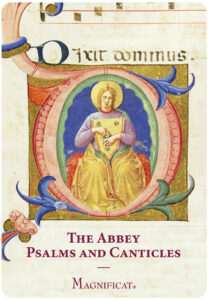 The Abbey Psalms and Canticles, an English translation of the Psalms prepared by the monks at Conception Abbey in 2010 and first published as The Revised Grail Psalms. The Abbey Psalms and Canticles is a revision of that work, finished in 2020 and published by the United States Conference of Catholic Bishops (USCCB). Wording and numbering of some Psalms and verses in other translations may differ. This new translation of the Psalms in the process of being added to all English-language Liturgy of the Hours books used in the United States. The USCCB also plans a liturgical Bible based on the NABRE translation.
The Abbey Psalms and Canticles, an English translation of the Psalms prepared by the monks at Conception Abbey in 2010 and first published as The Revised Grail Psalms. The Abbey Psalms and Canticles is a revision of that work, finished in 2020 and published by the United States Conference of Catholic Bishops (USCCB). Wording and numbering of some Psalms and verses in other translations may differ. This new translation of the Psalms in the process of being added to all English-language Liturgy of the Hours books used in the United States. The USCCB also plans a liturgical Bible based on the NABRE translation.
“Unlike other prayers in sacred Scripture, the prayers contained in the Psalms are not inserted into a narrative story that specifies their meaning and function. Instead, the Psalms are given to the believer precisely as a text of prayer. Since they are the Word of God, the believer who prays the Psalms speaks to God using the very words that God himself has given to us. Thus, in praying the Psalms we learn to pray. The Psalms are a school of prayer.”—Pope Benedict XVI
welcome to our in-depth study of the Psalms
We invite groups and individuals to check out the sample first lesson from this 28- lesson Turning to
lesson Turning to  God’s Word Catholic Bible study. Our online study pages include additional questions, commentary, and prayers based on the Psalm texts. Sing a New Psalm: Communicating with God Through the Prayers of the Church—Volume I: Lauds & Vespers has been granted an imprimatur. A digital version of this study can be purchased from our website shop. Volume II: Vigils, Day Prayer & Compline is scheduled for publication in 2025. If you have a Bible-related question or comment, click on one of the “ask us your question” or “what do you think” buttons on any online study page.
God’s Word Catholic Bible study. Our online study pages include additional questions, commentary, and prayers based on the Psalm texts. Sing a New Psalm: Communicating with God Through the Prayers of the Church—Volume I: Lauds & Vespers has been granted an imprimatur. A digital version of this study can be purchased from our website shop. Volume II: Vigils, Day Prayer & Compline is scheduled for publication in 2025. If you have a Bible-related question or comment, click on one of the “ask us your question” or “what do you think” buttons on any online study page.
open with prayer
It’s always wise to begin any Bible study with prayer, whether reading the Scriptures alone or meeting with others in a discussion study group. You can pray using your own words, pray one of the Psalms in this lesson, or use one of the opening prayers on our website. We especially like the following:
Lord Jesus, you promised to send your Holy Spirit
to teach us all things.
As we read and study your word today,
allow it to touch our hearts and change our lives. Amen.
here’s a question: what do you think that your soul is worth?
Lesson 11, “God Will Ransom My Soul,” focuses on Psalms appropriate to pray at Vespers (Evening Prayer). The illustration created  by Turning to God’s Word co-founder Tami Palladino suggests the time of day in two ways—through the darkening sky at dusk, and through a cemetery setting that points toward the evening of life. The Psalmist’s meditations on death apparently were intended to push his audience to ask what their own lives might be worth. This is a question Christians shouldn’t avoid. How do you think it is that we can benefit in the here-and-now from remembering our mortality? When during the liturgical year does the Church especially focus on the idea that death is inevitable? Click on Tami’s illustration (right) to enlarge it. Her original illustration is on page 47 in Sing a New Psalm: Communicating with God Through the Prayers of the Church—Volume I: Lauds & Vespers.
by Turning to God’s Word co-founder Tami Palladino suggests the time of day in two ways—through the darkening sky at dusk, and through a cemetery setting that points toward the evening of life. The Psalmist’s meditations on death apparently were intended to push his audience to ask what their own lives might be worth. This is a question Christians shouldn’t avoid. How do you think it is that we can benefit in the here-and-now from remembering our mortality? When during the liturgical year does the Church especially focus on the idea that death is inevitable? Click on Tami’s illustration (right) to enlarge it. Her original illustration is on page 47 in Sing a New Psalm: Communicating with God Through the Prayers of the Church—Volume I: Lauds & Vespers.
how much is too much?
The accumulation of wealth can be a major impediment to spiritual growth, and often is complicated by humanity’s inability to determine how many riches are too many. Consider how much wealth you think is essential in life.
 read the Catechism—men & women differ from animals
read the Catechism—men & women differ from animals
Paragraph 1951 in the Catechism of the Catholic Church includes this quote from the early Christian writer Tertullian, who died in the middle of the 2nd century:
1951 Alone among all animate beings, man can boast of having been counted worthy to receive a law from God: as an animal endowed with reason, capable of understanding and discernment, he is to govern his conduct by using his freedom and reason, in obedience to the One who has entrusted everything to him.
WHAT DO YOU THINK about discerning true value?
The Psalms chosen for Thursday Vespers (Week I) lead readers to think about what they value most. Discernment is a somewhat trendy term, and it’s not unusual to hear Christians speaking about their need to discern this or to discern that when what they really mean to say is that they intend to stall in order to avoid having to make a tough decision.
 ? What spiritual resources do you think are necessary to gain wisdom and understanding prior to making a crucial decision?
? What spiritual resources do you think are necessary to gain wisdom and understanding prior to making a crucial decision?
? How do you determine what guidance God is giving you?
? What role does the virtue of obedience play in your discernment process?
? What can you do to guarantee that you have an open mind to hear what God may be saying to you?
ex libris—two books about spiritual direction
Two of the best books we’ve recently come across that discuss the practical ins and outs of 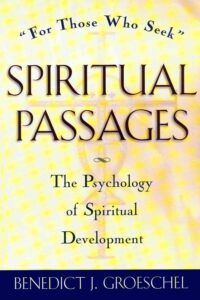
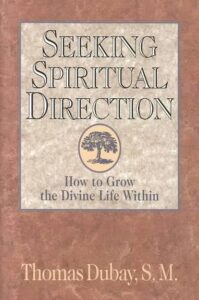 discernment are Spiritual Passages by Benedict Groeschel, C.F.R., and Seeking Spiritual Direction by Thomas Dubay, S.M. Both authors have written other excellent books as well, but people interested in learning more about spiritual direction may find these two titles particularly insightful. At ex libris—main bookshelf, you can read excerpts from both of these books and also learn more about these and other works related to Catholic Bible study.
discernment are Spiritual Passages by Benedict Groeschel, C.F.R., and Seeking Spiritual Direction by Thomas Dubay, S.M. Both authors have written other excellent books as well, but people interested in learning more about spiritual direction may find these two titles particularly insightful. At ex libris—main bookshelf, you can read excerpts from both of these books and also learn more about these and other works related to Catholic Bible study.
 the popes inspire us—a stern meditation on death
the popes inspire us—a stern meditation on death
“Corruptible Creatures” on page 46 in Sing a New Psalm: Communicating with God Through the Prayers of the Church—Volume I: Lauds & Vespers is from an audience with Pope St. John Paul II. In Psalm 49, the Holy Father sees a realistic and stern meditation on death, and he goes on to cite another Old Testament passage to support his view that ignoring the inevitability of our own death is both useless and inappropriate.
ransom—you could look it up in our archives
 “Ransom” in the Old Testament appears in connection with animal sacrifice. To learn what’s significant about Jesus’ appropriation of this word, read Lost in Translation, an online column in which Turning to God’s Word author Matthew Phelps helps readers connect with ideas expressed in the original languages of the Scriptures. New Lost in Translation entries are posted on Mondays, and past entries are archived on our website. Contact us if you’d like to receive Lost in Translation by email every week. More about ransom can be found in paragraph 1741 in the Catechism of the Catholic Church.
“Ransom” in the Old Testament appears in connection with animal sacrifice. To learn what’s significant about Jesus’ appropriation of this word, read Lost in Translation, an online column in which Turning to God’s Word author Matthew Phelps helps readers connect with ideas expressed in the original languages of the Scriptures. New Lost in Translation entries are posted on Mondays, and past entries are archived on our website. Contact us if you’d like to receive Lost in Translation by email every week. More about ransom can be found in paragraph 1741 in the Catechism of the Catholic Church.
 1741 Liberation and salvation. By his glorious Cross Christ has won salvation for all men. He redeemed them from the sin that held them in bondage. “For freedom Christ has set us free.” In him we have communion with the “truth that makes us free.” The Holy Spirit has been given to us and, as the Apostle teaches, “Where the Spirit of the Lord is, there is freedom.” Already we glory in the “liberty of the children of God.”
1741 Liberation and salvation. By his glorious Cross Christ has won salvation for all men. He redeemed them from the sin that held them in bondage. “For freedom Christ has set us free.” In him we have communion with the “truth that makes us free.” The Holy Spirit has been given to us and, as the Apostle teaches, “Where the Spirit of the Lord is, there is freedom.” Already we glory in the “liberty of the children of God.”
Q&A—Old Testament desert dwellers & Lebanon as a biblical image
Two questions related to this lesson are concerned with geography in and around the land of Canaan settled by the descendants of Jacob.
 Q1: Who are the desert dwellers in Psalm 72:9? [Editor’s note: Not all translations have “desert dwellers”; some refer to “the king’s foes” instead.]
Q1: Who are the desert dwellers in Psalm 72:9? [Editor’s note: Not all translations have “desert dwellers”; some refer to “the king’s foes” instead.]
A1: Although “desert dwellers” sometimes refers to the Israelites themselves, especially their patriarchal ancestors Abraham, Isaac, and Jacob, it’s clear from the context in Psalm 72 that these desert dwellers are enemies of the Israelites, something that is more apparent in translations that refer to “the king’s foes” instead of “desert dwellers.” It’s less clear whether the Psalmist is writing about a particular group of people or using the term to refer to all of the neighboring nations who worship other gods. Looking at the term from a spiritual point of view, however, both translations could describe people lacking access to life-giving water—literally lacking access to water to drink but also spiritual access to the water of life that Jesus mentions in the fourth chapter in the Gospel According to John. You can learn more in Lesson 5 There Came a Woman of Samaria in the Turning to God’s Word Catholic Bible study, The Gospel According to John: An Encounter with Grace & Truth. So in a Christian sense, desert dwellers might be seen as any people in a state of spiritual dryness and aridity. In the context of Psalm 72, we might assume that such people are in a state of spiritual need because they’ve refused to ask for or to accept the life-giving water offered by Jesus. That’s just one interpretation. There certainly are other ways of looking at it.
access to the water of life that Jesus mentions in the fourth chapter in the Gospel According to John. You can learn more in Lesson 5 There Came a Woman of Samaria in the Turning to God’s Word Catholic Bible study, The Gospel According to John: An Encounter with Grace & Truth. So in a Christian sense, desert dwellers might be seen as any people in a state of spiritual dryness and aridity. In the context of Psalm 72, we might assume that such people are in a state of spiritual need because they’ve refused to ask for or to accept the life-giving water offered by Jesus. That’s just one interpretation. There certainly are other ways of looking at it.
 Q2: What’s meant by “its fruits rustle like Lebanon” in Psalm 72:16? [Editor’s note: Some translations render this phrase as “it’s fruits be like Lebanon.”]
Q2: What’s meant by “its fruits rustle like Lebanon” in Psalm 72:16? [Editor’s note: Some translations render this phrase as “it’s fruits be like Lebanon.”]
A2: The image of the fruits that rustle like Lebanon is a reference to the abundance of Lebanon, which is a common theme in the Old Testament. The beloved one in the Song of Songs comes from Lebanon. The cedars of Lebanon also were famous and were used to build the Temple at Jerusalem. Because Lebanon was so lush, there was abundant growth with lots of fruits and other vegetation. Due to Lebanon’s location by the sea, winds moving inland rustle through the trees. In this verse the Psalmist is using the image of Lebanon poetically to help his audience call to mind the abundance God can provide.
oops—a correction in the study book
Despite our best efforts reading and rereading our Bible studies before we send them to be printed, occasionally something wrong sneaks past us, especially in first editions. The range of the first Scripture citation in Question 6 in Sing a New Psalm: Communicating with God Through the Prayers of the Church—Volume I: Lauds & Vespers has been corrected. The updated Question 6 now reads:
Question 6 Read Psalm 72:1–4, which is an appeal to God to provide a royal dynasty. What qualities are essential for the king’s heir? Read the First Book of the Kings 3:3–12. Which king in Israel’s history was known for wise judgment? In the Gospel According to Luke 1:30–33, Mary is told that the child she is to bear will be given the throne of David, his father. Who else is named as the child’s father? What limitations are placed on the kingdom that Mary’s child is to inherit?
the best Catholic commentary about Scripture
 To find out more about how Church teaching is supported by passages in Sing a New Psalm: Communicating with God Through the Prayers of the Church—Volume I: Lauds & Vespers, check out the Index of Citations in the Catechism of the Catholic Church. Links to the primary Scripture passages in the lesson (Revised Standard Version Catholic Edition [RSVCE*]) and relevant paragraphs in the Catechism are provided here. Not every passage in the biblical text for this study is referenced in a Catechism paragraph, however, including Psalm 49 and Psalm 72 in this lesson.
To find out more about how Church teaching is supported by passages in Sing a New Psalm: Communicating with God Through the Prayers of the Church—Volume I: Lauds & Vespers, check out the Index of Citations in the Catechism of the Catholic Church. Links to the primary Scripture passages in the lesson (Revised Standard Version Catholic Edition [RSVCE*]) and relevant paragraphs in the Catechism are provided here. Not every passage in the biblical text for this study is referenced in a Catechism paragraph, however, including Psalm 49 and Psalm 72 in this lesson.
don’t forget about our indexes & extra online material

 If you’re trying to locate information about a specific Scripture passage, you can look it up in the index at the back of the study book or sample lesson. If you want to find a particular commentary, you can look up its title in the topics index. To learn more about another book of the Bible for which there’s a Turning to God’s Word study, visit the online study directories to read the commentaries and watch any accompanying videos. Finally, if you have a question or would like to make a comment about any of our studies, you can use one of the “ask us your question” or “what do you think” buttons to email our authors.
If you’re trying to locate information about a specific Scripture passage, you can look it up in the index at the back of the study book or sample lesson. If you want to find a particular commentary, you can look up its title in the topics index. To learn more about another book of the Bible for which there’s a Turning to God’s Word study, visit the online study directories to read the commentaries and watch any accompanying videos. Finally, if you have a question or would like to make a comment about any of our studies, you can use one of the “ask us your question” or “what do you think” buttons to email our authors.
ex libris—Church documents & books about religious topics
Link to magisterial documents referred to in our Bible studies at ex libris—magisterial documents.  This listing includes significant recent encyclicals as well as a number of historical Church documents. Recommended books related to Scripture study can be found at ex libris—main bookshelf.
This listing includes significant recent encyclicals as well as a number of historical Church documents. Recommended books related to Scripture study can be found at ex libris—main bookshelf.
wondering how to pronounce some of these words?
The following links are to readings from the New International Version (NIV) Bible. To listen, open one of the links and click on the audio icon above the printed text. Although not taken from the translations used in our study materials, the NIV readings provide an audio guide to pronunciation of words in this lesson’s primary biblical texts. A close online version of the translation of the Bible used in Catholic liturgy in the United States as well as an audio guide for daily Mass readings for the current month can be found on the website of the United States Conference of Catholic Bishops (USCCB).
 close with a Psalms-based prayer for Thursday Vespers (Week I)
close with a Psalms-based prayer for Thursday Vespers (Week I)
Many of our Catholic study groups like to conclude their discussions with a prayer based on the scriptural focus of their lesson. If you’re uncomfortable composing your own Bible-based prayers, you can follow our four easy steps. If you prefer, you can pray any of the Psalms in this lesson, or you can use the following short prayer.
O God, you rule over all things and judge what happens on earth.
Teach us to avoid condemning others
as we attempt to discern between right and wrong
so that we may follow your path of righteousness
all the days that you have given us.
We ask this in the name of your Son, Jesus Christ,
who will come to judge the living and the dead. Amen.
Lesson 12 Have Mercy on Me, O God, Friday Lauds (Week I)—Psalm 51, Psalm 117, and Psalm 146
Lesson 10 Awake, My Soul! Thursday Lauds (Week I)—Psalm 57, Psalm 80, and Psalm 81
you also may like our study of the book of Exodus
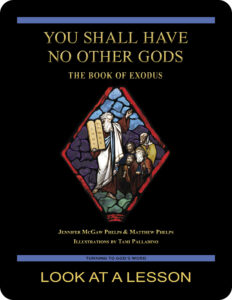 You Shall Have No Other Gods: The Book of Exodus, a 28-lesson Catholic Bible study with an imprimatur, provides an in-depth look at how significant events in biblical history that occurred thousands of years ago to descendants of Jacob remain relevant and even critical for present-day Christians to understand. The deliverance of the Hebrews from slavery in Egypt and the giving of Ten Commandments are examined along with the development of Moses’ relationship to God. Click on the book’s cover to view a sample lesson.
You Shall Have No Other Gods: The Book of Exodus, a 28-lesson Catholic Bible study with an imprimatur, provides an in-depth look at how significant events in biblical history that occurred thousands of years ago to descendants of Jacob remain relevant and even critical for present-day Christians to understand. The deliverance of the Hebrews from slavery in Egypt and the giving of Ten Commandments are examined along with the development of Moses’ relationship to God. Click on the book’s cover to view a sample lesson.
start a Turning to God’s Word Bible study
Thank you for your interest in Sing a New Psalm: Communicating with God Through the Prayers of the Church—Volume I: Lauds & Vespers. 
 More information about beginning a Turning to God’s Word Bible study can be found on this website at start a Bible study, and Tami, Matthew, and I are available to answer questions or discuss concerns. Contact us to start this or one of our other studies or to have your schedule listed with other TtGW study groups on our website. —Jennifer
More information about beginning a Turning to God’s Word Bible study can be found on this website at start a Bible study, and Tami, Matthew, and I are available to answer questions or discuss concerns. Contact us to start this or one of our other studies or to have your schedule listed with other TtGW study groups on our website. —Jennifer
*There are seven deuterocanonical books in the Old Testament—the Books of Tobit, Judith, Wisdom, Sirach, Baruch, and First and Second Maccabees, as well as some passages in the Books of Esther and Daniel. Protestants usually refer to these works as “apocryphal,” a word that means “outside the (Protestant) canon” because they’re excluded from most Protestant Bibles. The word “deuterocanonical” means “second canon”; Catholics use that word to refer to any section of the Catholic Old Testament for which there are no extant, or existing, Hebrew manuscripts. All of the deuterocanonical books appear in the Septuagint, the earliest remaining versions of which date to the 1st century B.C. This Greek translation of the Old Testament was in common use by Jews at the time of Jesus. Learn more by reading How Do Catholic & Protestant Bibles Differ?
Turning to God’s Word printed Bible studies use the 2006 Revised Standard Version Second Catholic Edition (RSV2CE) translation for all Scripture references except the Psalms, which are taken from The Abbey Psalms and Canticles, prepared by the monks of Conception Abbey and published in 2020 by the United States Conference of Catholic Bishops (USCCB). All Scripture links for the online study pages for Sing a New Psalm: Communicating with God Through the Prayers of the Church—Volume I: Lauds & Vespers are to the 1966 Revised Standard Version Catholic Edition (RSVCE) translation. The New International Version (NIV) audio recordings follow the same chapter and verse numbering as the RSV Catholic translations, but the NIV doesn’t include the deuterocanonical passages.
The 1966 RSVCE uses archaic pronouns and verb forms such as “thee,” “thou,” “didst” in the Psalms and in direct quotations attributed to God. The 2006 RSV2CE replaces these with more accessible English. The few significant translation changes in the RSV2CE include rendering almah as “virgin” in the Book of Isaiah 7:14 and restoring the term “begotten” in the Gospel According to John 3:16.
The Psalms in this Bible study reflect numbering used in The Abbey Psalms and Canticles; Psalms numbering may vary in other translations. Numbering also may vary for a few other passages in this Bible study. Turning to God’s Word studies follow the numbering in the Revised Standard Version Catholic translations (RSVCE and RSV2CE). Discrepancies in the New American Bible Revised Edition (NABRE) are noted in the Index of Scripture Citations in the study book and the online sample.
 The companion to this Catholic Bible study from Turning to God’s Word, Sing a New Psalm: Communicating with God Through the Prayers of the Church—Volume II: Vigils, Day Prayer & Compline, will cover Psalms not included in Volume I: Lauds & Vespers. Volume II: Vigils, Day Prayer & Compline is scheduled for publication in 2025.
The companion to this Catholic Bible study from Turning to God’s Word, Sing a New Psalm: Communicating with God Through the Prayers of the Church—Volume II: Vigils, Day Prayer & Compline, will cover Psalms not included in Volume I: Lauds & Vespers. Volume II: Vigils, Day Prayer & Compline is scheduled for publication in 2025.
